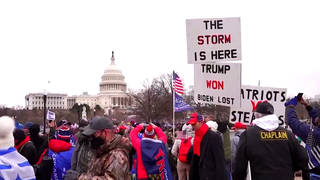
Guests
- Daniel Kammenscience envoy for the State Department and professor of energy at University of California at Berkeley.
Pentagon-commissioned reports have concluded the effects of climate change over the next 20 years could result in global catastrophe that leads to millions of deaths from war and natural disasters. We get response from Daniel Kammen, science envoy for the State Department and professor of energy at University of California at Berkeley, who argues the report resonated with U.S. officials, and agrees that “clean energy is one of our best defenses against [displacement], because we can build energy resources for poor communities … with none of the downside.”
Transcript
AMY GOODMAN: Now, Daniel Kammen, what about this? I mean, you’re having top security briefings. I mean, President-elect Trump is right now. Whether his children will be included is another issue, whether he—
DANIEL KAMMEN: We’ll see.
AMY GOODMAN: He’s asked for top security clearance for them. But the Pentagon, more than any other institution, knows the effects of climate change. They have issued warnings, that President Bush kept—tried to keep under wraps, saying this will be the issue—
DANIEL KAMMEN: Right.
AMY GOODMAN: —and the pressure for wars in the 21st century.
DANIEL KAMMEN: Yeah.
AMY GOODMAN: What about that?
DANIEL KAMMEN: Well, that was a historic event. And researchers around the planet were really pleased to see the analysis by the Pentagon’s internal experts and external deliberations highlight how climate change changes everything. President Obama used that report to then highlight exactly what we just heard, saying that climate change makes all other problems worse. And in my own work in East Africa, in South Sudan, in Kenya, in Ethiopia, as well as in Southeast Asia, we see this every single day. Communities that are overwhelmed by even relatively small droughts or floods are then displaced. And one of the shames is that what the Pentagon highlighted was that clean energy is one of our best defenses against that, because we can build energy resources for poor communities more rapidly with clean energy than with dirty energy—with none of the downside. And that message resonated across the U.S. government—at State Department, at USAID and our collaborations with the U.K.’s version of the same, with our partners in the Nordic countries. That really galvanized an investment in off-grid technologies, mini grids and a clean energy twist.














Media Options